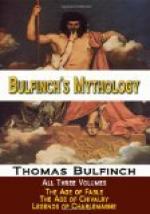It happened one day that a damsel of the court, entering the closet where Tristram’s arms were deposited, perceived that a part of the sword had been broken off. It occurred to her that the missing portion was like that which was left in the skull of Moraunt, the Irish champion. She imparted her thought to the queen, who compared the fragment taken from her brother’s wound with the sword of Tristram, and was satisfied that it was part of the same, and that the weapon of Tristram was that which reft her brother’s life. She laid her griefs and resentment before the king, who satisfied himself with his own eyes of the truth of her suspicions. Tristram was cited before the whole court, and reproached with having dared to present himself before them after having slain their kinsman. He acknowledged that he had fought with Moraunt to settle the claim for tribute, and said that it was by force of winds and waves alone that he was thrown on their coast. The queen demanded vengeance for the death of her brother; the fair Isoude trembled and grew pale, but a murmur rose from all the assembly that the life of one so handsome and so brave should not be taken for such a cause, and generosity finally triumphed over resentment in the mind of the king. Tristram was dismissed in safety, but commanded to leave the kingdom without delay, and never to return thither under pain of death Tristram went back, with restored health, to Cornwall.
King Mark made his nephew give him a minute recital of his adventures. Tristram told him all minutely; but when he came to speak of the fair Isoude he described her charms with a warmth and energy such as none but a lover could display. King Mark was fascinated with the description, and, choosing a favorable time, demanded a boon[Footnote: “Good faith was the very corner-stone of chivalry. Whenever a knight’s word was pledged (it mattered not how rashly) it was to be redeemed at any price. Hence the sacred obligation of the boon granted by a knight to his suppliant. Instances without number occur in romance, in which a knight, by rashly granting an indefinite boon, was obliged to do or suffer something extremely to his prejudice. But it is not in romance alone that we find such singular instances of adherence to an indefinite promise. The history of the times presents authentic transactions equally embarrassing and absurd”—Scott, note to Sir Tristram.] of his nephew, who readily granted it. The king made him swear upon the holy reliques that he would fulfil his commands. Then Mark directed him to go to Ireland, and obtain for him the fair Isoude to be queen of Cornwall.
Tristram believed it was certain death for him to return to Ireland; and how could he act as ambassador for his uncle in such a cause? Yet, bound by his oath, he hesitated not for an instant. He only took the precaution to change his armor. He embarked for Ireland; but a tempest drove him to the coast of England, near Camelot, where King Arthur was holding his court, attended by the knights of the Round Table, and many others, the most illustrious in the world.




